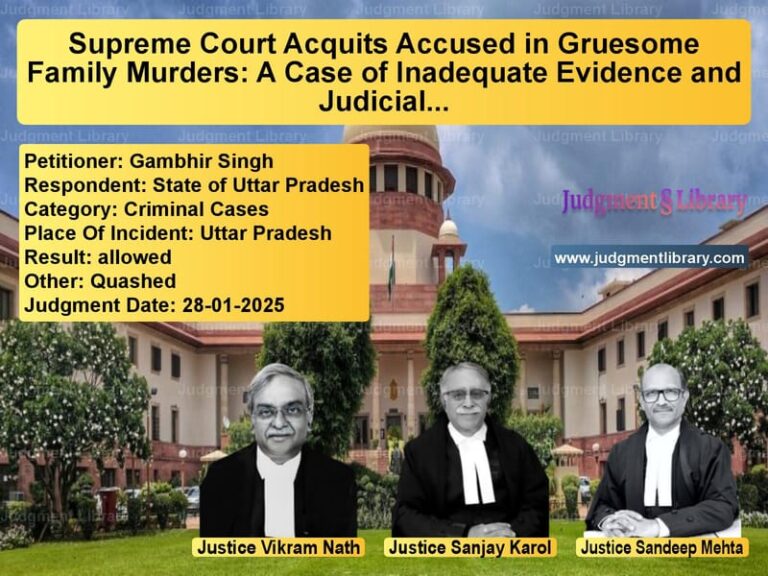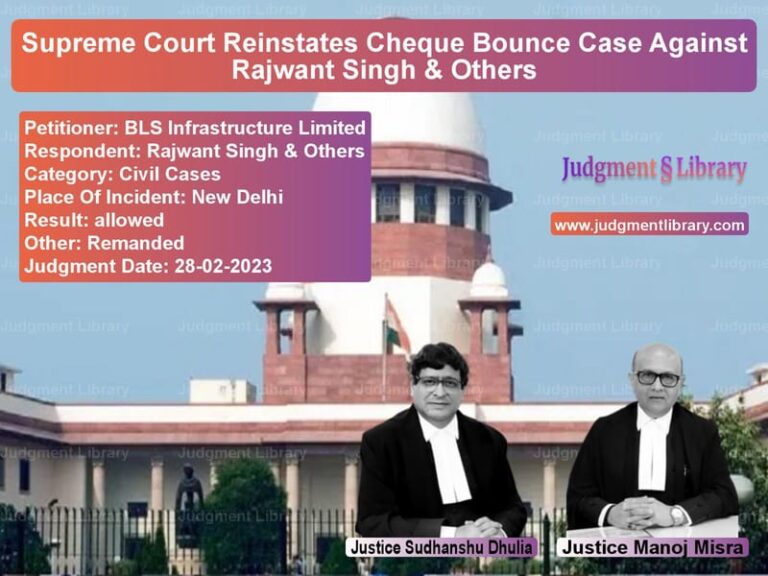Tenant Eviction and Rent Act: Supreme Court Upholds Mandatory Rent Determination Before Eviction
The Supreme Court of India, in its judgment in the case of Ram Pratap v. Anand Kanwar & Others, reaffirmed the mandatory nature of provisional rent determination before a tenant can be evicted under Section 13(1)(a) of the Rajasthan Premises (Control of Rent and Eviction) Act, 1950 (Rent Act). The ruling, delivered on August 21, 2018, by a bench comprising Justice N.V. Ramana and Justice S. Abdul Nazeer, upheld the Rajasthan High Court’s decision remanding the case to the trial court. The Supreme Court emphasized that without rent determination under Section 13(3) of the Rent Act, an eviction decree on the ground of rent default cannot be passed.
Background of the Case
The case involved a dispute between the landlord Ram Pratap (plaintiff) and his tenant Anand Kanwar (defendant). The plaintiff filed a suit for eviction in 1984, claiming that the tenant had defaulted on rent payments from July 1, 1981, to June 30, 1984. The tenant, in defense, argued that he had been paying rent regularly to a close relative of the landlord, Onkar Singh, who issued rent receipts. Additionally, the tenant deposited rent in court under Section 19A of the Rent Act.
The trial court ruled in favor of the landlord on July 20, 1995, directing the tenant to vacate the premises and pay arrears. The tenant appealed, but the first appellate court upheld the eviction decree. Subsequently, the tenant filed a second appeal before the Rajasthan High Court, which ruled that Section 13(3) was mandatory and remanded the case for fresh adjudication.
Petitioner’s (Landlord’s) Arguments
The landlord contended:
- The defendant (tenant) intentionally did not appear before the trial court, leading to an ex-parte decree.
- The determination of rent under Section 13(3) was unnecessary, as the trial court proceeded ex-parte due to the tenant’s absence.
- The amended provision in Section 13(3) was meant to protect the landlord’s interest during the eviction proceedings.
- The High Court was wrong in remanding the matter, as the trial court had already ruled correctly on the eviction.
Respondent’s (Tenant’s) Arguments
The tenant countered:
- Section 13(3) and 13(4) of the Rent Act are mandatory provisions, requiring the court to determine provisional rent before proceeding with eviction.
- The tenant had filed a written statement and deposited rent under Section 19A, demonstrating compliance with the Rent Act.
- The trial court had adjourned the matter multiple times for rent determination but ultimately failed to make such determination.
- Failure to determine rent under Section 13(3) deprived the tenant of the valuable right under Section 13(6), which prevents eviction if rent is paid as determined by the court.
Supreme Court’s Observations
The Supreme Court closely examined the legislative intent and previous judgments regarding rent control laws. The key observations were:
- Rent Determination is Mandatory: The Court ruled that the use of the word ‘shall’ in Section 13(3) imposed a duty on the trial court to determine rent provisionally.
- Section 13(6) Protection: If a tenant deposits rent as determined by the court, no eviction order can be passed under Section 13(1)(a).
- Tenant’s Rights: A tenant’s right under Section 13(6) is lost if rent determination is not conducted, making such determination a necessary step.
- Trial Court’s Error: The trial court failed to determine rent and proceeded with eviction without fulfilling the procedural requirements.
Final Judgment
After considering both sides, the Supreme Court held:
- The Rajasthan High Court was correct in ruling that Section 13(3) is mandatory.
- The trial court’s failure to determine rent before eviction was an error.
- The matter was properly remanded for fresh adjudication.
- The Supreme Court dismissed the landlord’s appeal, affirming that rent determination must occur before an eviction decree can be passed.
Implications of the Judgment
The ruling reinforces tenant rights under the Rajasthan Rent Act and sets a precedent for similar cases:
- Precedent for Tenant Protection: Courts must ensure compliance with rent determination provisions before ordering eviction.
- Trial Courts’ Responsibility: Courts are mandated to provisionally determine rent before framing issues.
- Fairness in Eviction Cases: Landlords must follow due process rather than relying on ex-parte judgments.
- Clarity in Rent Control Laws: The ruling strengthens tenant safeguards against arbitrary eviction.
Conclusion
The Supreme Court’s decision in Ram Pratap v. Anand Kanwar & Others underscores the mandatory nature of rent determination before eviction under the Rajasthan Rent Act. This ruling ensures that landlords cannot bypass procedural safeguards, and tenants are given an opportunity to comply with court-determined rent. By upholding the High Court’s decision, the judgment reinforces the importance of due process and equitable application of rent control laws.
Petitioner Name: Ram Pratap.Respondent Name: Anand Kanwar & Others.Judgment By: Justice N.V. Ramana, Justice S. Abdul Nazeer.Place Of Incident: Rajasthan.Judgment Date: 21-08-2018.
Don’t miss out on the full details! Download the complete judgment in PDF format below and gain valuable insights instantly!
Download Judgment: Ram Pratap vs Anand Kanwar & Other Supreme Court of India Judgment Dated 21-08-2018.pdf
Direct Downlaod Judgment: Direct downlaod this Judgment
See all petitions in Landlord-Tenant Disputes
See all petitions in Property Disputes
See all petitions in Damages and Compensation
See all petitions in Judgment by N.V. Ramana
See all petitions in Judgment by S. Abdul Nazeer
See all petitions in dismissed
See all petitions in Remanded
See all petitions in supreme court of India judgments August 2018
See all petitions in 2018 judgments
See all posts in Civil Cases Category
See all allowed petitions in Civil Cases Category
See all Dismissed petitions in Civil Cases Category
See all partially allowed petitions in Civil Cases Category







